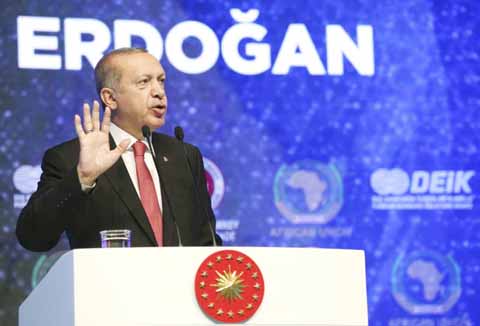
AP, Ankara :
The Turkish president is suggesting that Turkey’s military could soon launch a new operation across the border into northern Syria, in zones held by Syrian Kurdish fighters.
Recep Tayyip Erdogan’s statement is renewing a threat to expand Turkey’s military operations into areas east of the Euphrates River held by U.S.-backed Syrian Kurds.
Ankara considers the Syrian Kurdish militia as terrorist and part of a Kurdish insurgency within Turkey.
Erdogan says: “God willing, very soon … we will leave the terror nests east of the Euphrates in disarray.” He spoke on Friday at a military ceremony honoring Turkish commando soldiers.
Turkey launched incursion into Syria in 2016 and 2018, into areas west of the Euphrates, pushing Islamic State militants as well as Syrian Kurdish fighters from the border area.
Meanwhile, not far from where he used to live, Palestinian engineer Mahmud Khaled watched as bulldozers rumbled back and forth scooping up smashed concrete from the devastated streets of Syria’s Yarmuk.
Once home to 160,000 Palestinian refugees, the camp in the Damascus suburbs has been emptied of its inhabitants and pounded to rubble in Syria’s seven-year war.
But five months after regime forces expelled the last jihadists in the area, soldiers now stand guard at the camp’s entrance, wearing face masks to protect themselves against the dust billowing up into the air.
On a narrow street inside the camp where he grew up, Khaled has returned to help oversee bulldozers and diggers engaged in joint Palestinian-Syrian clean-up operations.
“When we first entered, we were horrified by what we saw,” said the 56-year-old engineer, wearing a light grey and white checkered shirt.
“But after we started the clean-up, it all started to look up,” Khaled said.
Off Yarmuk’s main artery, recently cleared side streets are flanked by buildings ravaged by years of fighting.
Some have been reduced to mountains of grey rubble and mangled rebar. In others, entire floors dangle dangerously downwards, their steel rods jutting out. “We have shifted 50,000 cubic metres of rubble and reopened all the main roads,” Khaled said.
But “it will be a while before families can come back”, he added. As Khaled surveyed the neighbourhood, a yellow bulldozer spilled rubble into a large red truck behind him.
Tens of thousands have fled Yarmuk since Syria’s conflict started in 2011 and government forces imposed a crippling siege on the then rebel-held camp a year later.
Since the latest round of fighting to expel the Islamic State group ended in May, the United Nations agency for Palestinian refugees (UNRWA) said no residents have been allowed to return.
Walking through the camp, Khaled pointed out his former home and the office where he used to work. The first had been damaged in fighting, while the second was completely destroyed.

